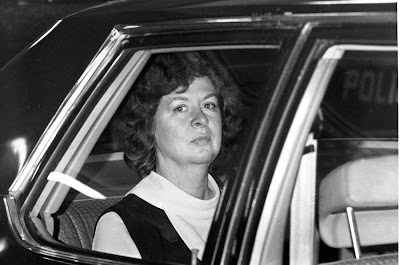Ford's legacy will endure
 Tuesday marked the passing of one of our most underrated presidents, Gerald R. Ford. Of all of the mid-to-late 20th century presidents, he gets talked about the least, but he deserves a great deal of credit for his stewardship following President Richard Nixon's downfall and resignation.
Tuesday marked the passing of one of our most underrated presidents, Gerald R. Ford. Of all of the mid-to-late 20th century presidents, he gets talked about the least, but he deserves a great deal of credit for his stewardship following President Richard Nixon's downfall and resignation.I post the photo above because when people pass away, I prefer to remember and commemorate them as they looked during their younger days, not how they looked just prior to death.
Many call Ford our "accidental president," not out of malice, but because he really did not want, nor did he seek the presidency.
 His ascension to the Oval Office is without parallel. On October 10, 1973, President Nixon's first vice president, Spiro Agnew, resigned in disgrace amid charges of income tax evasion. Ford was nominated to take Agnew's place on October 12, and he took the oath of office for vice president on December 12, 1973 upon his confirmation by the House. It received scant attention by the media, as the political firestorm continued to envelop Nixon's presidency.
His ascension to the Oval Office is without parallel. On October 10, 1973, President Nixon's first vice president, Spiro Agnew, resigned in disgrace amid charges of income tax evasion. Ford was nominated to take Agnew's place on October 12, and he took the oath of office for vice president on December 12, 1973 upon his confirmation by the House. It received scant attention by the media, as the political firestorm continued to envelop Nixon's presidency.Ford barely had time to make the seat warm in the vice president's chair before he was summoned again, this time by White House Chief of Staff Alexander M. Haig on August 1, 1974, to let him know that a "smoking gun" had been found on the Nixon tapes, implicating the president in criminal wrongdoing. Nixon resigned on August 9, 1974, and at noon, Ford took the oath of office. ...
 However, upon taking the oath of office, President Ford made the biggest of all political blunders - pardoning President Nixon. It's a debate that will probably rage for decades, if not centuries in American political discourse. Should Ford have pardoned Nixon, or should have Nixon suffered the consequences for his administration's criminal behavior?
However, upon taking the oath of office, President Ford made the biggest of all political blunders - pardoning President Nixon. It's a debate that will probably rage for decades, if not centuries in American political discourse. Should Ford have pardoned Nixon, or should have Nixon suffered the consequences for his administration's criminal behavior?Ultimately, I understand why Ford pardoned Nixon. America needed to get moving again. Watergate had enveloped the nation for over two years and paralyzed its foreign policy. I've changed my stance over the years on Ford's decision to pardon Nixon. Up until a few years ago, I thought it was criminal of Ford to let Nixon skate; the American people deserved answers, I used to haughtily intone.
Well, I still feel that way - a trial would have paralyzed the nation, and probably almost certainly would have killed Nixon, and by that I mean physically. Some close to the former president at the time following his resignation even felt that Nixon might have committed suicide.
 But, I strongly feel that Ford pardoned Nixon too soon. Without even being formally charged, Nixon was exonerated of all charges. The American people deserved better. Yes, I realize I didn't "live" in those times, so I'm only going on what I've read. I was born in 1971, so I was alive, but at three years old, I remember nothing of those events.
But, I strongly feel that Ford pardoned Nixon too soon. Without even being formally charged, Nixon was exonerated of all charges. The American people deserved better. Yes, I realize I didn't "live" in those times, so I'm only going on what I've read. I was born in 1971, so I was alive, but at three years old, I remember nothing of those events.In my view, Ford should have at least let the charges come out against Nixon. Americans at least deserved to learn of Nixon and his administration's criminal misconduct before the entire mess was swept under the rug with a pardon. (Above, Ford signs the pardon on the Oval Office on September 8, 1974)
The pardon set off another political firestorm in America, and this even touched his own administration. Ford's first press secretary, Jerry terHorst, resigned in protest the next day. More importantly, it severely hurt Ford's credibility as the new president. Many still believe that a deal had been struck between Ford and Nixon; in return for Nixon's resignation, Ford would grant him a pardon.
Prior to Nixon's resignation, Haig had indeed offered Ford a deal, but most historians agree that Ford pardoned Nixon on his own.
In the end, though, I think the pardon, irrespective of its timing, was the right thing to do, even though it certainly cost him the election in 1976. Had he not pardoned Nixon, Ford would have beaten Jimmy Carter and remained president. (The election was very close, so no pardon could have made a world of difference.)
 Several former leaders also gained experience in the Ford Administration. Future President George H.W. Bush (above, left) meets with President Ford after being appointed Director of the CIA.
Several former leaders also gained experience in the Ford Administration. Future President George H.W. Bush (above, left) meets with President Ford after being appointed Director of the CIA. A Ford between two Edsels. President Ford (center) talks with Donald Rumsfeld (left) and Dick Cheney (right) in the Oval Office in 1975.
A Ford between two Edsels. President Ford (center) talks with Donald Rumsfeld (left) and Dick Cheney (right) in the Oval Office in 1975. Here's one that a president got right - Gerald Ford tears up in the East Room of the White House while listening to President Clinton's remarks while receiving the Presidential Medal of Freedom in 1999. It was certainly a better decision than Bush's awarding the Medal of Freedom to the likes of George Tenet, who oversaw one of the biggest intelligence failures in U.S. history. Bush threw him under the bus in the wake of the WMD intel failure, Tenet resigned, and Bush gave him the MOF. I wonder how long it will be until Rumsfeld gets his? But, I digress.
Here's one that a president got right - Gerald Ford tears up in the East Room of the White House while listening to President Clinton's remarks while receiving the Presidential Medal of Freedom in 1999. It was certainly a better decision than Bush's awarding the Medal of Freedom to the likes of George Tenet, who oversaw one of the biggest intelligence failures in U.S. history. Bush threw him under the bus in the wake of the WMD intel failure, Tenet resigned, and Bush gave him the MOF. I wonder how long it will be until Rumsfeld gets his? But, I digress. Ford also had his dangerous detractors. On September 5, 1975, Lynette "Squeaky" Fromme tried to shoot Ford, and she may have succeeded, but she forgot to chamber a round into the firing chamber of her .45 before pulling the trigger.
Ford also had his dangerous detractors. On September 5, 1975, Lynette "Squeaky" Fromme tried to shoot Ford, and she may have succeeded, but she forgot to chamber a round into the firing chamber of her .45 before pulling the trigger. Fromme (above) is currently serving a life sentence.
Fromme (above) is currently serving a life sentence. Just 17 days later, Sara Jane Moore (Below) managed to get off a shot toward Ford in San Francisco, but the shot was deflected. (Above, Ford approaches his limo as Moore fires)
Just 17 days later, Sara Jane Moore (Below) managed to get off a shot toward Ford in San Francisco, but the shot was deflected. (Above, Ford approaches his limo as Moore fires) After losing the '76 election, Ford kept probably the lowest profile of any recent former president. He occasionally made an appearance or went out for a round of golf, but he didn't make headlines in the vein of Clinton or his successor, Jimmy Carter.
After losing the '76 election, Ford kept probably the lowest profile of any recent former president. He occasionally made an appearance or went out for a round of golf, but he didn't make headlines in the vein of Clinton or his successor, Jimmy Carter. He did do one thing that all other ex-presidents to date haven't managed to do, and that's live 93 years plus. He became the longest living president last month, besting Ronald Reagan by a little over a month.
He did do one thing that all other ex-presidents to date haven't managed to do, and that's live 93 years plus. He became the longest living president last month, besting Ronald Reagan by a little over a month.Ford was a good and decent man who healed our nation in the aftermath of a real constitutional crisis, and that will be his greatest legacy.
God bless, and rest in peace, Mr. President.
Labels: Bill Clinton, George H.W. Bush, Gerald R. Ford, Jimmy Carter, Nixon Pardon, Presidential Medal of Freedom, Richard Nixon, Ronald Reagan, Watergate








0 Comments:
Post a Comment
<< Home